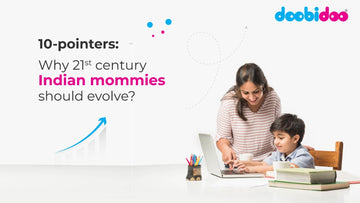Motherhood in the 21st century is a journey of adaptation and evolution. Embracing technology, nurturing independence, prioritizing self-care, and cultivating emotional intelligence are key components of modern motherhood. As mothers continue to evolve in response to societal changes and challenges, they play a crucial role in shaping the next generation of well-rounded, compassionate individuals.
The 21st century has brought forth significant advancements in technology, shifts in societal norms, and changing family dynamics. Consequently, motherhood has evolved and continues to do so rapidly. As mothers navigate this dynamic landscape, understanding the reasons behind their evolution and adopting strategies for positive growth becomes imperative. This blog explores why and how 21st-century mothers should evolve to embrace modern challenges while ensuring the well-being of their families.
1. Embracing Technology
One of the most prominent factors impacting motherhood in the 21st century is technology. Mothers today need to embrace technology, leveraging its benefits to enhance parenting and communication. Digital tools can facilitate educational opportunities for children, simplify daily tasks, and help stay connected with loved ones, even across long distances.
2. Nurturing Independence
As traditional gender roles blur and both parents share responsibilities, 21st-century mothers should focus on nurturing their children's independence. Encouraging self-reliance and decision-making skills empowers children to become confident individuals, preparing them for the challenges of the future.
3. Prioritizing Self-Care
Modern motherhood demands a delicate balance between family and personal well-being. To meet the demands of a fast-paced world, mothers must prioritize self-care. Investing time in physical and mental health is crucial for maintaining resilience and providing the best support to their families.
4. Embracing Diversity and Inclusion
With globalization and diverse cultural interactions becoming the norm, 21st-century mothers must embrace diversity and inclusion in their parenting approach. Encouraging open-mindedness and respect for different perspectives helps raise compassionate, empathetic children who can navigate a multicultural world.
5. Cultivating Emotional Intelligence
In the digital age, emotional intelligence holds even more value. 21st-century mothers should focus on teaching emotional awareness and communication skills to their children. With focus on empathy. Emotionally intelligent individuals are better equipped to handle stress, form meaningful relationships, and manage conflicts effectively.
6. Flexible Work-Life Balance
Modern mothers often juggle multiple roles, including work and family responsibilities. Embracing flexible work arrangements can help strike a better work-life balance. Companies offering remote work options, flexible hours, and parental leave policies can significantly support mothers in managing their professional and personal commitments.
7. Environmental Consciousness
As environmental concerns escalate, 21st-century mothers have a vital role in fostering eco-consciousness in their families. Encouraging sustainable practices and instilling a sense of environmental responsibility in children can have a profound impact on the planet's future. Who better than our granny to teach us this ?
8. Building Support Networks:
Mothers today should actively seek and cultivate support networks. Engaging with other parents, joining online communities, or participating in local parenting groups can provide a valuable source of advice, empathy, and encouragement during challenging times.
By embracing these changes and seeking support when needed, 21st-century mothers can navigate their roles with confidence and grace, contributing to a brighter future for their families and society as a whole.
9. And now let’s talk about self-sustenance by women.
Self-sustenance and money-making are essential aspects of modern motherhood. Empowering mothers to achieve financial independence not only benefits their families but also fosters a sense of personal fulfilment. Here are additional pointers on self-sustenance and money-making, along with examples of women leaders in the corporate world who have achieved remarkable success:
A. Pursuing Entrepreneurship: Encouraging mothers to explore entrepreneurial ventures can provide them with the flexibility to manage their time effectively while pursuing their passions
B. Continuing Education and Skill Development: In the rapidly evolving job market, continuous learning is crucial. Mothers can invest in their education and skill development to stay relevant and adaptable.
C. Remote Work Opportunities: The rise of remote work has opened up new avenues for mothers to balance work and family life.
D. Mentorship and Networking: Establishing connections with mentors and professional networks can provide valuable insights and opportunities for career advancement. Indra Nooyi, former CEO of PepsiCo, has emphasized the importance of mentorship in her journey to success.
E. Financial Literacy: Teaching financial literacy to mothers is essential for making informed decisions about money management and investments.
Self-sustenance and money-making play a pivotal role in the evolution of 21st-century mothers. By pursuing entrepreneurship, continuous learning, and remote work opportunities, women can achieve financial independence while fulfilling their familial responsibilities.
Kiran Mazumdar-Shaw: As the founder of Biocon Limited, Kiran Mazumdar-Shaw is a prominent figure in the biotechnology industry. She started her company in 1978, and today, Biocon is one of India's leading biopharmaceutical companies. Her pioneering efforts have contributed significantly to the growth of the biotech sector in India.
Zia Mody: Zia Mody is a prominent corporate lawyer and the co-founder of AZB & Partners, one of India's leading law firms. She is renowned for her expertise in mergers and acquisitions and corporate law. Zia Mody's work has had a significant impact on shaping India's legal landscape.
Arundhati Bhattacharya: Arundhati Bhattacharya made history by becoming the first woman to head the State Bank of India (SBI), India's largest public sector bank. As Chairperson of SBI, she played a vital role in modernizing the bank and promoting financial inclusion.
Vinita Bali: Vinita Bali served as the Managing Director of Britannia Industries, a leading food and beverage company in India. Under her leadership, Britannia witnessed significant growth and expansion, making it a formidable player in the FMCG sector.
Naina Lal Kidwai: Naina Lal Kidwai is a renowned banker who served as the Country Head of HSBC India. She was also the first woman to lead the Federation of Indian Chambers of Commerce and Industry (FICCI). Her contributions to the finance and business sectors have been widely recognized.
Ekta Kapoor: Ekta Kapoor is a prominent Indian film and television producer, known for her contributions to the entertainment industry. She is the Joint Managing Director and Creative Director of Balaji Telefilms, a leading production house in India.
Roshni Nadar Malhotra: Roshni Nadar Malhotra is the Executive Director and CEO of HCL Corporation and is also the Chairperson of HCL Technologies, one of India's top IT services companies. Her leadership has been instrumental in driving HCL's growth and success.
Conclusion -
India has seen remarkable progress in women's empowerment in the corporate world. The achievements of leaders like Kiran Mazumdar-Shaw, Zia Mody, Arundhati Bhattacharya, Vinita Bali, Naina Lal Kidwai, Ekta Kapoor, and Roshni Nadar Malhotra serve as inspiring examples for women aspiring to excel in their respective industries. These women have shattered glass ceilings and proved that with determination, talent, and hard work, women can thrive and make a significant impact in the corporate landscape of India.




